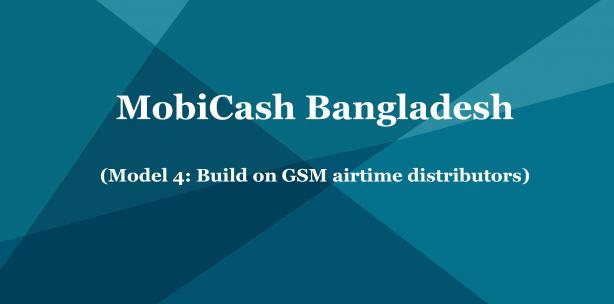
Digital finance was really catalysed in Bangladesh in 2011 when Dutch-Bangla Bank (DBBL) and bKash launched their services in May and July respectively. Since then, these providers have managed to grow at incredibly robust rates that have set them apart in a competitive field containing 28 licensed providers. The telecoms providers cannot obtain licenses for any digital financial services beyond rudimentary bill payments and ticketing services. However they do sell access to their channels (USSD, SMS etc.) over which many of these digital finance systems operate, and are still looking at ways they can play a greater role in the digital payments value chain.
Download the full case study by clicking on the 'download' button
Grameenphone realised that by converting some of its 300,000 GSM airtime retailers into agents it might be able to interest some of the licensed providers that were having trouble with the strategic and operational implications of building and managing an agent network efficiently, as well as other providers who in addition to that wanted to expand their operations to full scale rapidly. In mid-2012 Grameenphone partnered with two banks to pilot a scheme to convert 500 airtime retailers into agents.
After a year of learning from the pilot, Grameenphone aggressively expanded the agent network under the brand MobiCash[1]. Effectively, it uses selected airtime distributors as master agents to nominate qualified GSM (or other types of retailer in their vicinity) to offer digital finance. By December 2014, it had registered 61,000 agents; however, this exceptional growth rate means that only about 50% of agents are active on a 30-day basis (~30,500).
The initial training that agents are given is co-facilitated by the master agent and the regional MobiCash team, after which they begin operations. Master agents already have staff/field forces who visit agents at least 2-3 times a week for the GSM business, and they equip these staff to provide rebalancing services during their visits. The master agents’ employees are also supposed to provide monitoring and support services, but the growing number of agents and the volume of business mean that staff do not have sufficient time to handle these more complex tasks.
The agents receive a handset and a SIM card (till) which has a single integrated menu they use to offer services for all the providers. They offer customer registration, and cash-in/cash-out services from five banks, with a sixth being finalized[2], as well as MobiCash’s own ticketing and bill payment services. Each outlet is supplied with MobiCash marketing collateral plus all of the partner banks’ logos.
MobiCash would like to develop a dominant agent network at the national level. However the issue remains that every agent it invests in is allowed to offer direct services for any other organisation in the market. Its activity rate of 50% also means that for every two agents it recruits and trains, one becomes dormant. This effectively doubles its on-boarding costs, and also doubles the risk of providing low quality service for customers. These issues seem to be common in Bangladesh, but MobiCash is prioritizing them, as agent network management is the core business for the brand, and it would like to attract more bank partnerships in the future.
[1] For a more detailed account of how MobiCash works, see: Shrader, L. & Noor, W. (February 2014). MobiCash Shared Agent Network – Bangladesh. CGAP.
[2] Grameenphone is partnered with DBBL, Islami Bank, UCB, Mercantile & One Bank, and is currently also integrating with IFIC Bank.





